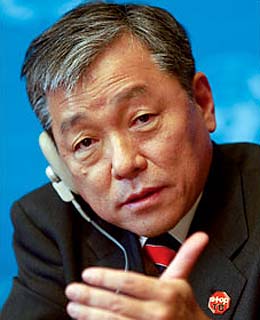
He never had a grand sense of mission to "save the world," as he puts it. Instead, he was motivated by a fascination with population-size health problems—infectious diseases that claim not handfuls of victims but tens of thousands if left untreated. What lured this Korean-born physician from working with leprosy patients in Hawaii to heading up the immunization program at the World Health Organization (WHO) and led to his being appointed the agency's top executive last year was the notion that as devastating as these diseases could be, they could also be stopped. "What I learned from my career in public health is the importance of action," he says. But when there are 192 member states to answer to, action is not always easy. WHO's responsibilities range from providing basic health education to responding to the outbreak of unknown diseases. It is Lee's job to direct the agency's resources where they are needed—and can accomplish—the most.
Since taking office, Lee has steered WHO into uncharted medical waters. After a decade of ceding the primary role in the worldwide fight against AIDS to the U.N., WHO is making a stronger commitment to ensuring that available drug treatments get to as many of the 40 million infected around the world as possible. Under his direction, the agency is pushing its first antitobacco treaty—urging nations to levy higher taxes on tobacco and widen smoke-free areas—and working to update the international rules for dealing with disease outbreaks. It's an ambitious agenda for WHO, and its success will ultimately rest on how well Lee can move beyond the talk and put it into action.